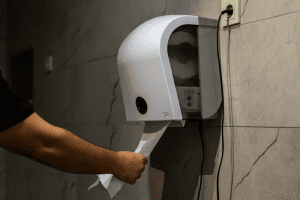Mice are a common household pest that can wreak havoc on your home. They cause destruction to furniture, electrical wiring and even food – making the kitchen sink an especially vulnerable spot where mice love to hide and thrive due to all of the food, water and warmth available there.
If you find mice under your sink, take action now in order to prevent a full-blown infestation. In this article we’ll show you how to get rid of mice from under your sink and keep them away for good!
Signs of a mouse infestation under the kitchen sink
A mouse infestation under your kitchen sink can be a serious issue. Here are some telltale signs that there may be mice living there:
Mouse droppings:

If you happen to stumble upon tiny, black droppings that bear an uncanny resemblance to grains of rice, chances are high that these are the telltale signs of mice inhabiting your humble abode.
Keep your eyes peeled for these droppings in areas such as under your kitchen sink or other nooks and crannies around your house. It’s always better to nip a potential infestation in the bud, so make sure to act swiftly and efficiently!
Gnawed materials:

It’s a known fact that mice possess some mighty strong teeth, which they love to keep razor-sharp by gnawing away at various materials, including wood, plastic, and more. So, if you happen to stumble upon some gnaw marks on objects placed beneath your kitchen sink, like food packaging or wooden cabinets, it could very well be a telltale sign that you’re dealing with a full-on mouse infestation.
Nesting materials:

Mice often make nests in warm, hidden places. If you find any shredded paper, fabric, or other materials under your kitchen sink, it could be indicative of mice activity there.
Foul odor:
Mice can leave behind a strong, musky smell in their habitats. If you detect an unpleasant odour coming from under your kitchen sink, it could be indicative of an active mouse problem.
Scratching or scurrying sounds:
If you happen to pick up on some strange scratching or scurrying sounds emanating from beneath your kitchen sink or any other spots within your abode, then it’s highly possible that those noises are being generated by the frenzied movements of some mice that have taken up residence in your humble abode.
Food containers with gnaw marks:

Mice often chew through food containers to get at their contents. If you discover any gnaw marks on food containers under your kitchen sink or elsewhere in your home, it could be indicative of a mouse infestation.
Pet behavior:
If you happen to have any pets, then there’s a chance that they may start acting strangely around the kitchen sink area, whether it be sniffing or scratching around the base of the cabinets. This type of behavior could very well indicate that some pesky mice have made themselves right at home. In the event that you do pick up on any of these warning signs, it’s crucial that you take immediate action to remove these uninvited guests from your humble abode.
After all, a mouse infestation can potentially lead to a myriad of health problems and property damage, making it all the more imperative to tackle the issue head-on and nip it in the bud, pronto!
9 Tips to Get Rid of Mice Under Your Kitchen Sink
Do you suspect that there might be some pesky mice currently residing under your kitchen sink, but you’re not quite sure how to proceed in terms of getting rid of them? Well, fret not, as luck would have it, there are actually a number of natural remedies and methods that you can implement in order to achieve success. To give you a head start, here are nine handy tips that you can try out:
Peppermint Oil:
Mice are put off by the smell of peppermint oil, so to deter them from near your kitchen sink area, soak some cotton balls in it and place them around it.
Mothballs:
Mice are particularly repulsed by the strong aroma of mothballs, so place some around your kitchen sink area to deter them.
Steel Wool:
Mice will not chew through steel wool. Fill any holes or gaps around your kitchen sink area with steel wool to prevent them from entering.
Baking Soda and Sugar:
Make a simple solution: mix equal parts baking soda and sugar together in a shallow dish near the kitchen sink. Mice will eat this mixture, and the baking soda will react with the acid in their stomachs to poison them.
Traps for Mice Control:
Mouse traps come in several varieties and styles; snap traps are the most popular and designed to quickly kill the mouse. Glue traps use a sticky surface to secure mice to one place while electronic traps deliver an electric shock to kill it.
Snap Traps:
Snap traps are the most efficient way to catch mice. Place them near the kitchen sink with bait (such as cheese or peanut butter) facing towards the wall.
Glue Traps:
Glue traps are effective, though they do not immediately kill the mouse. Place them near your kitchen sink and promptly dispose of any trapped rodent.
Electronic Traps:
Electronic traps offer a humane way to eliminate mice. They use high voltage shocks that instantly kill the mouse, so place them near your kitchen sink and dispose of the dead mouse as quickly as possible.
Clean the Kitchen:
Mice are attracted to food and water sources. Keep your kitchen tidy, free from crumbs, spills, and standing water not only make it less appealing for mice but also avoid some other problem with kitchen sink such as fruit flies, smell like rotten egg, damaged pipes,…
This video also share about ways to get rid of mice, watch it to get suitable methods for your home:
Prevent mice from getting under your kitchen sink in future
Sealing potential entry points and gaps to prevent mice from entering the kitchen:
Mice can enter your home through small openings or gaps around pipes, windows, or doors. By caulking these entry points with caulk or steel wool (or other materials), you can prevent mice from accessing your kitchen and other areas of your residence.
Keeping the kitchen clean and organized to reduce the likelihood of attracting mice:
Mice are attracted to sources of food, water and shelter. To reduce the likelihood of attracting mice in your kitchen, keep it tidy and organized by wiping up spills or crumbs, storing food in airtight containers, and clearing away clutter.
Using mouse repellents, such as peppermint oil or ultrasonic devices, to deter mice from entering the kitchen:
Peppermint oil has a strong, unpleasant odor that mice don’t enjoy, so placing some drops on cotton balls and placing them in areas where mice are likely to enter can help keep them away. Ultrasonic devices emit high-frequency sound waves designed specifically to repel mice and other pests.
Mice are notorious for entering kitchens and other areas of your home, but you can reduce the likelihood of them entering with these prevention tips. Taking proactive measures to avoid an infestation will save time, money, and frustration in the long run.
Conclusion:
To sum up, having a bunch of mice residing under your kitchen sink can certainly be an aggravating and unhygienic issue to deal with. Nevertheless, the good news is that there are actually a number of effective strategies at your disposal to get rid of these pesky critters and prevent them from coming back.
Whether you prefer natural remedies like peppermint oil and mothballs, or are open to trying traps or hiring professional pest control services, there are options that can fit your budget and preferences.
By implementing these techniques and dealing with a mouse infestation in a timely manner, you can keep your home environment clean, secure, and free from unwanted rodent inhabitants.
FAQs
Mice are attracted to the warmth, shelter, and easy access to food sources that kitchen sinks provide.
Prevention methods include sealing any gaps or holes around pipes or cabinets, keeping food in sealed containers, and regularly cleaning the area under your sink.
Effective methods include using mousetraps, baits, or natural repellents such as peppermint oil. Always follow safety precautions and dispose of dead mice properly.
You can use steel wool or foam insulation to seal gaps or holes around pipes, as mice cannot chew through these materials.
Wear gloves and place the dead mouse in a plastic bag, seal it, and dispose of it in the trash. Clean and disinfect any surfaces the mouse may have come into contact with.




